Blog / Top 8 Real-Time Sales Forecasting Tools 2025
Top 8 Real-Time Sales Forecasting Tools 2025
Looking for the best sales forecasting tools in 2025? Here's a quick guide to eight top options tailored for businesses in the UAE. These tools combine AI, real-time data, and localised features to help companies predict sales, manage inventory, and adapt to market trends. Whether you're a small business or a large enterprise, there's a tool for you.
Key Tools:
- Salesforce: AI-driven forecasts with CRM integration, starting at AED 92/user/month.
- Anaplan: Advanced scenario planning and predictive modelling with custom pricing.
- Compass: Real-time insights for SMEs, starting at AED 1,500/month.
- Zendesk Sell: Pipeline tracking and win probability analysis, from AED 70/user/month.
- Oracle Demand Management Cloud: Enterprise-grade forecasting, AED 18,000–36,000/month.
- SAP Integrated Business Planning: ERP integration for large businesses, custom pricing.
- Blue Yonder: Supply chain-focused forecasting with custom pricing.
- IBM Planning Analytics: AI-powered modelling for complex operations, custom pricing.
Quick Comparison:
| Tool | Best For | Pricing (AED) | Key Features |
|---|---|---|---|
| Salesforce | All business sizes | 92+/user/month | Real-time CRM data, AI-powered forecasts |
| Anaplan | Enterprises | Custom | Scenario planning, multi-dimensional models |
| Compass | SMEs | 1,500+/month | Real-time insights, Arabic interface |
| Zendesk Sell | SMEs, growing teams | 70+/user/month | Pipeline tracking, win probability analysis |
| Oracle Demand Cloud | Large enterprises | 18,000–36,000/month | Demand planning, supply chain integration |
| SAP IBP | Enterprises | Custom | ERP integration, real-time analytics |
| Blue Yonder | Retail, manufacturing | Custom | Supply chain forecasting, AI insights |
| IBM Planning Analytics | Complex enterprises | Custom | AI-driven modelling, scenario planning |
These tools support local needs, including AED currency, Arabic interfaces, and compliance with UAE regulations like PDPL. Whether you're managing seasonal demand during Ramadan or scaling operations, these solutions can help streamline your forecasting process.
EP 53 | 10 Best Sales Forecasting Tools for 2025 | Outdoo Audio Blog #SalesPodcast #Podcast
How to Choose Real-Time Sales Forecasting Tools
Picking the right forecasting tool is a critical step for businesses in the UAE, where fast-paced markets demand precise, real-time insights. Here’s a breakdown of key factors to help you make an informed decision.
Real-time data integration is essential for effective sales forecasting. Look for tools that seamlessly pull data from CRM systems, marketing platforms, and customer interactions to provide up-to-the-minute insights. This feature is especially important in the UAE’s dynamic retail and e-commerce sectors, where rapid shifts in market trends require businesses to stay agile and informed.
Modern tools with AI and machine learning capabilities can elevate forecasting accuracy by automating complex analyses. However, technical compatibility is just as vital. Ensure the tool integrates smoothly with your existing CRM and ERP systems, such as Salesforce, HubSpot, or Oracle, using pre-built connectors. Reliable APIs and local support can minimise setup challenges and ensure a steady flow of accurate data with fewer manual errors.
Scalability is another important consideration. SMEs often need tools that support multi-currency transactions (including AED) and come with flexible pricing, typically ranging from AED 70 to AED 550 per user/month. On the other hand, larger enterprises require solutions capable of handling extensive data volumes and intricate workflows.
| Tool Category | Key Features | Typical AED Pricing | Best For |
|---|---|---|---|
| Basic Forecasting | Real-time data, CRM integration | 70–200 AED/user/month | SMEs, startups |
| AI-Enhanced | Machine learning, pattern recognition | 200–400 AED/user/month | Growing businesses |
| Enterprise Solutions | Advanced analytics, custom workflows | 400+ AED/user/month | Large organisations |
Security and compliance should never be overlooked, especially given the UAE’s stringent data privacy regulations. Look for tools offering strong encryption, data residency options, and certifications such as ISO 27001. Carefully review privacy policies and confirm that the tool aligns with regional compliance standards to protect sensitive business information.
The user experience plays a big role in ensuring successful adoption. Tools with intuitive interfaces encourage team engagement, while mobile access is invaluable for sales teams working on the move. Customisable dashboards tailored to local reporting needs and bilingual workflows (Arabic and English) further enhance usability.
Maintaining data quality is crucial for accurate forecasting. Choose tools equipped with features like duplicate detection, validation rules, and data hygiene capabilities to ensure clean and reliable inputs as your data grows in volume and complexity.
Don’t underestimate the importance of local support and implementation services. Collaborating with regional experts familiar with UAE business practices can make a significant difference in ensuring smooth deployment and ongoing optimisation. This is particularly important for tailoring the tool to industry-specific needs or regulatory requirements.
Lastly, assess the tool’s reporting and analytics capabilities. Advanced features like scenario planning, audit trails, and forecasting model comparisons can provide valuable insights for strategic decision-making. These tools help businesses analyse forecast variations and simulate different market scenarios, offering clarity and flexibility in planning for the future.
1. Salesforce
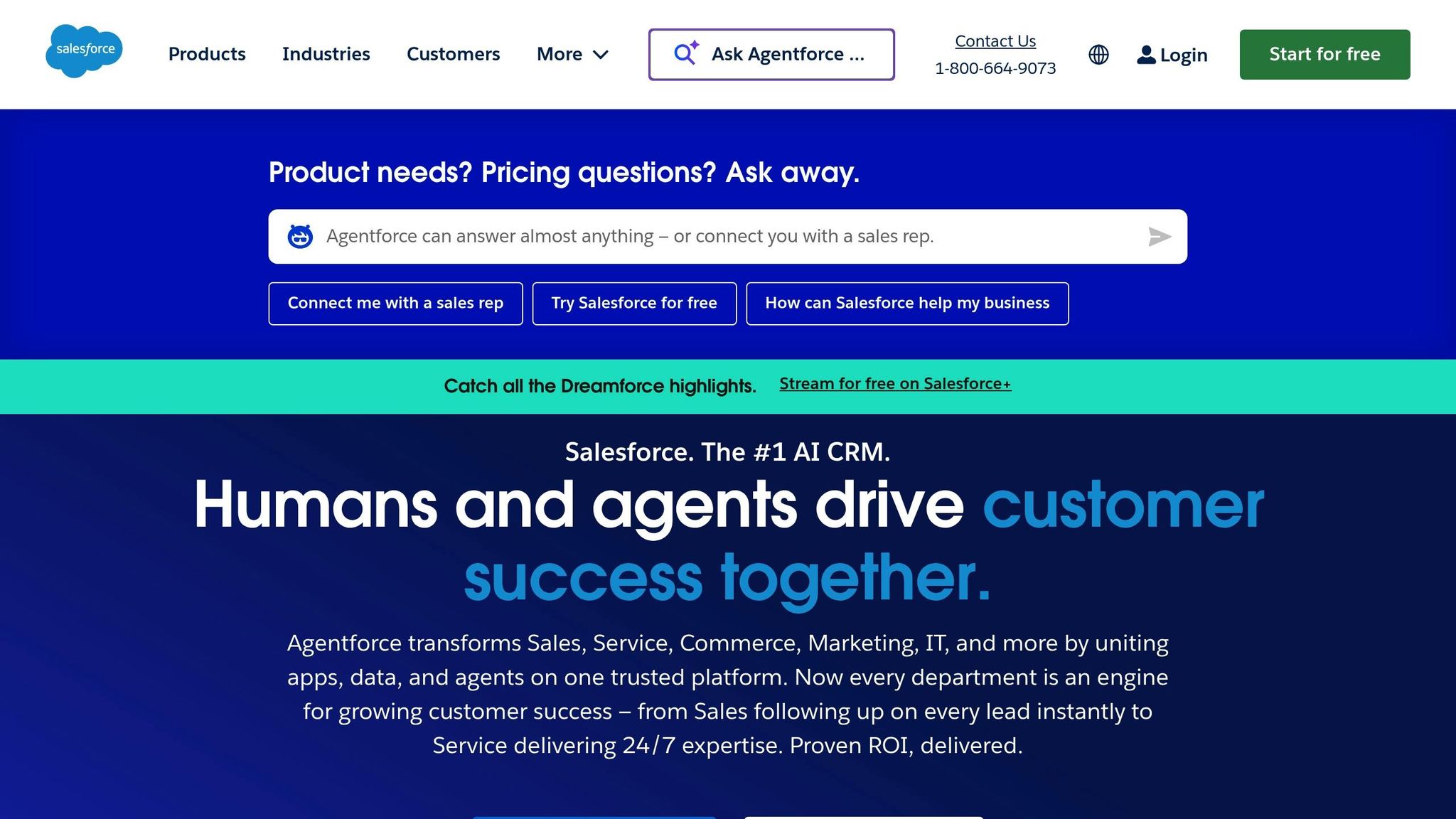
Salesforce offers a sales forecasting platform seamlessly integrated with its own CRM, starting at AED 92 per month (around US$25). This pricing makes it one of the more accessible options for enterprise-level solutions in the market.
Real-time data integration and automation
Salesforce pulls real-time data from CRM, ERP, and e-commerce systems, ensuring that sales forecasts are always up-to-date and accurate. Its automation tools - like workflow rules, scheduled reports, and AI-powered updates - allow sales teams in the UAE to cut down on manual tasks and minimise errors. These tools also enable quick responses to market shifts.
With its native CRM integration, Salesforce eliminates delays in data synchronisation. Forecasts are updated instantly whenever sales data changes, a feature that’s particularly valuable in the UAE’s fast-paced business environment where timely decisions are critical. This seamless integration lays the groundwork for Salesforce’s AI-driven forecasting precision.
AI and machine learning capabilities for predictive accuracy
Salesforce’s Einstein AI leverages historical data and trends to deliver highly accurate forecasts. Using advanced machine learning, Einstein can predict deal outcomes, suggest next steps, and update forecasts in real time. This helps UAE businesses make smarter, data-driven decisions.
Easy integration with ERP, CRM, and e-commerce platforms
Salesforce provides pre-built connectors and APIs that simplify integration with ERP systems like SAP and Oracle, as well as e-commerce platforms such as Shopify and Magento. This adaptability allows UAE companies to consolidate sales, inventory, and customer data, making forecasting and reporting more efficient across different business areas.
Localisation support (Arabic language, AED currency, regional compliance)
Salesforce is tailored for the UAE market, offering Arabic-language interfaces, right-to-left text formatting, AED (د.إ) currency support (e.g., AED 1,250.00), and localised date/time formats (DD/MM/YYYY, 24-hour clock).
When it comes to compliance, Salesforce adheres to SOC 2 Type II security standards and includes features like data encryption, user access controls, and audit trails. These measures help UAE businesses meet local data residency and privacy regulations. For example, a major UAE retail group used Salesforce’s real-time dashboards and Einstein AI, achieving a 15% increase in quarterly sales.
2. Anaplan
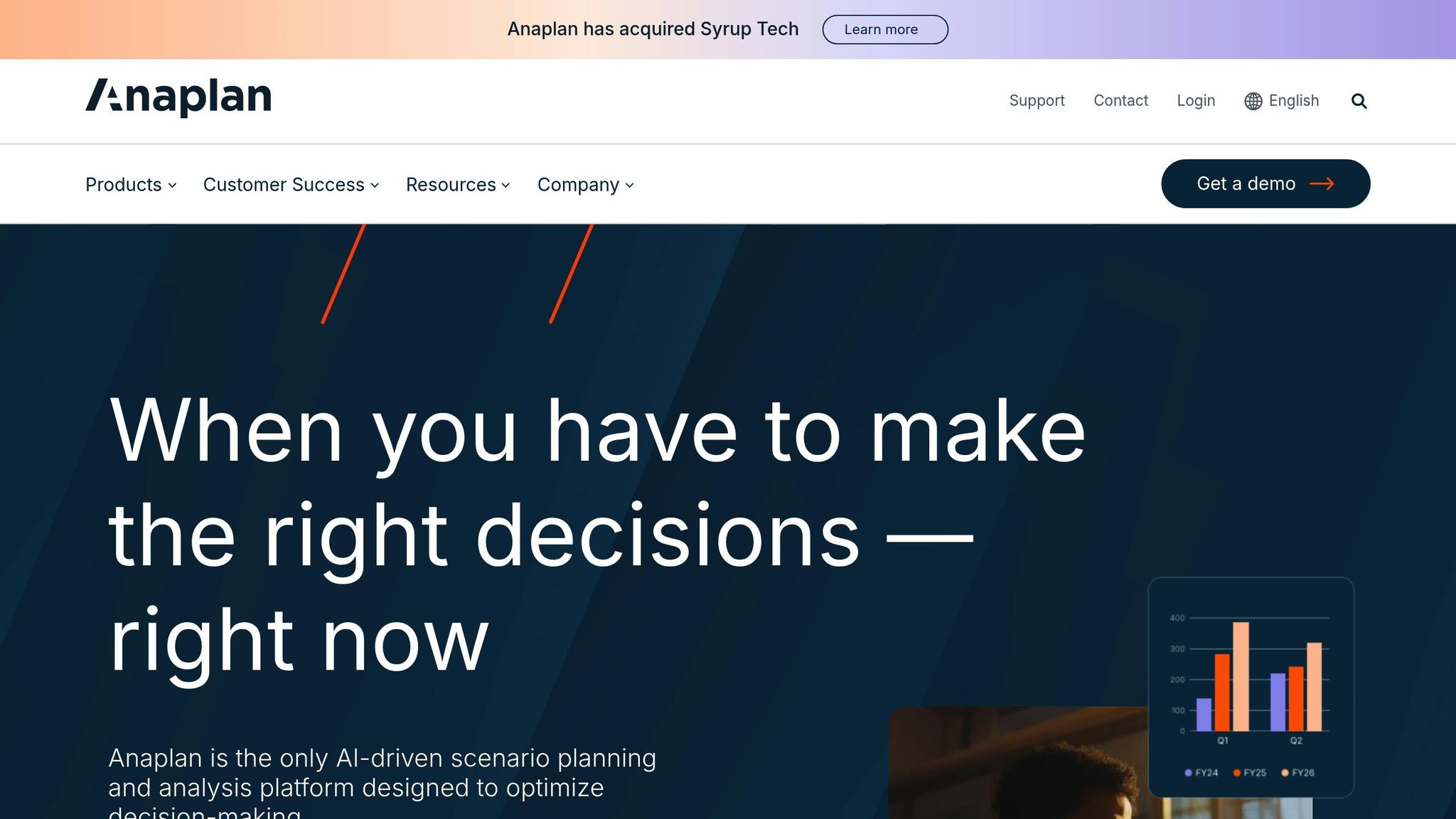
Anaplan is a robust enterprise sales forecasting tool, with builder licences starting at AED 55 per month (around US$15) and customised pricing based on specific business requirements. Its ability to handle intricate, multi-dimensional data models and foster collaboration across departments makes it a powerful choice for sales forecasting. Let’s dive into its standout features.
Real-time Data Integration and Automation
Anaplan connects seamlessly with over 30 data sources, including CRM, ERP, and spreadsheet systems, ensuring forecasts are always based on the most current information. Its automation capabilities take the hassle out of manual updates by dynamically refreshing forecasts as new data becomes available. This allows sales teams to stay agile and respond swiftly to changing market conditions. For UAE businesses operating across various channels, this simultaneous integration ensures precise and reliable forecasting.
AI and Machine Learning for Smarter Predictions
Using AI and machine learning, Anaplan analyses historical data to uncover trends that might not be immediately obvious. This predictive power helps businesses anticipate demand shifts and fine-tune their sales strategies. Additionally, its scenario modelling tools let companies evaluate the potential outcomes of different strategies, offering UAE businesses a way to test ideas before committing to full-scale implementation.
Integration with ERP, CRM, and E-commerce Platforms
Anaplan integrates effortlessly with major ERP systems like SAP and Oracle, CRM platforms such as Microsoft Dynamics, and various e-commerce solutions. Thanks to APIs, connectors, and pre-built templates, the integration process is smooth and efficient. This compatibility ensures a unified approach to forecasting and reporting, even for organisations with complex tech ecosystems.
Localisation for the UAE Market
Anaplan supports multi-currency operations, including AED formatting (e.g., AED 1,000.00). It also caters to Arabic-speaking users and complies with UAE-specific regulations, offering advanced security features tailored to regional needs. With role-based access control, data encryption, and audit trails, Anaplan ensures compliance with both local and global data privacy standards.
For example, a prominent UAE retail group adopted Anaplan to consolidate sales data from multiple stores and online channels. By utilising real-time data integration and AI-driven forecasting, the company enhanced its demand planning accuracy, cut inventory costs, and adapted more effectively to market trends.
3. Compass
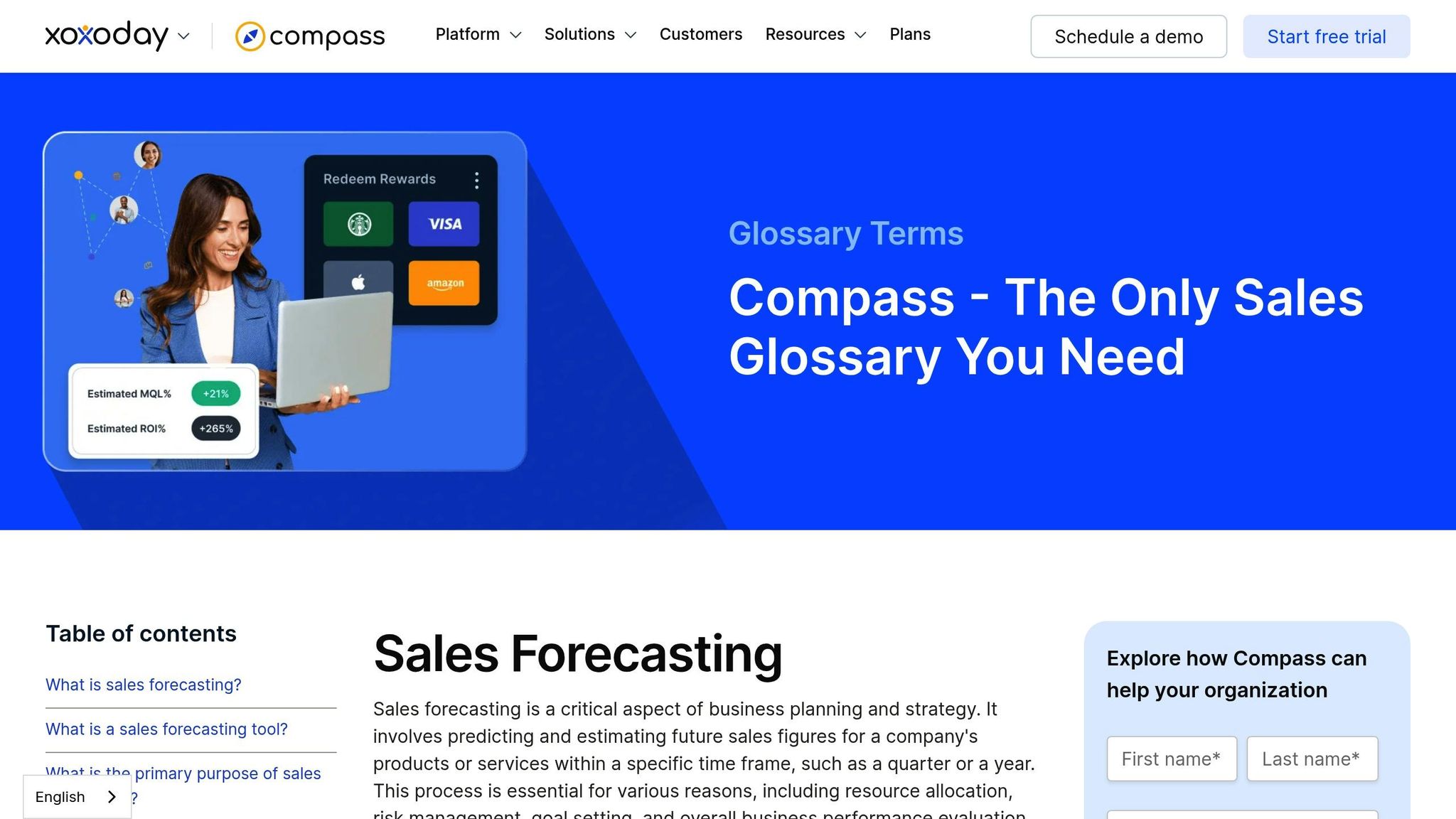
Compass delivers a robust sales forecasting solution tailored for UAE businesses, with pricing starting at AED 1,500 per month for small to mid-sized enterprises. Its standout features include precise, real-time insights and localisation tools specifically designed for the GCC region.
Real-time Data Integration and Automation
Compass excels in real-time data capabilities, syncing seamlessly with CRM, ERP, and e-commerce systems. By automating data imports and generating reports, it ensures forecasts are always up to date. Workflow triggers instantly update forecasts as new data comes in, reducing errors and enhancing reliability.
For local businesses managing complex sales channels, this integration eliminates the need to juggle multiple systems. Sales teams can access unified data, covering everything from inventory updates to customer purchase trends, making it a single source of truth for forecasting.
AI and Machine Learning for Smarter Predictions
Using AI and machine learning, Compass analyses historical data to predict trends. These algorithms continuously improve as they process new data, offering increasingly accurate forecasts. The platform also accounts for seasonality, market trends, and external factors like regional events in the UAE, enabling businesses to make quicker, well-informed decisions in a dynamic market.
In January 2024, a leading Dubai retail chain adopted Compass to enhance their sales forecasting. Within three months, they reported a 25% drop in forecast errors and a 15% boost in sales efficiency. The project, led by Sales Operations Manager Ahmed Al-Mansoori, involved integrating Compass with their existing ERP and CRM systems.
Easy Integration with ERP, CRM, and E-commerce Platforms
Compass offers robust API support, making it compatible with major ERP systems like SAP and Oracle, CRM platforms such as Salesforce and HubSpot, and e-commerce tools like Shopify and Magento. This seamless integration unifies data, streamlining operations.
For example, a Dubai-based electronics distributor saw a 20% improvement in forecast accuracy and a 15% reduction in excess inventory after implementing Compass. These results were driven by the platform's real-time analytics and AI-powered insights.
Localisation Features
Compass is designed with the GCC market in mind, offering a fully Arabic language interface to ensure local teams can use the platform effectively. It also supports AED currency formatting (د.إ 1,000.00) and includes features to comply with regional regulations.
Data security is a top priority, with end-to-end encryption, role-based access controls, and regular security audits safeguarding sensitive business information. These measures align with local compliance standards, giving UAE businesses confidence in their data management.
In a 2024 survey of GCC sales teams, 78% of Compass users reported greater confidence in their sales forecasts and improved alignment between sales and operations. These results highlight Compass’s effectiveness in addressing the unique needs of the regional market.
4. Zendesk Sell
Zendesk Sell has carved a niche in the UAE market by combining sales forecasting with customer service data. Starting at AED 70 per user per month for the Team plan, it offers businesses a unified view of their revenue pipeline, helping them spot opportunities and risks that other CRMs might miss.
Real-time Data Integration and Automation
Zendesk Sell provides live updates on pipeline activity, automatically adjusting as deals progress. This eliminates the need for end-of-day reports, giving decision-makers instant access to the latest sales data. For businesses in the UAE's fast-paced markets, this feature is a game changer. These real-time insights also lay the foundation for the platform's predictive analytics.
AI and Machine Learning for Better Forecasting
The platform leverages AI and machine learning to improve forecast accuracy. By analysing historical and current pipeline data, it uses win probability forecasting to predict deal closures and estimate timelines based on similar past transactions. This helps sales teams focus their efforts on high-probability deals while continuously refining their forecasts.
Seamless Integration with Key Platforms
Zendesk Sell integrates effortlessly with widely used ERP systems, CRM platforms, and e-commerce tools. This seamless connectivity simplifies workflows and enhances operational efficiency.
Localisation and Compliance Support
The platform supports multiple languages, including Arabic, and offers data residency options to meet local compliance requirements, such as the UAE's Personal Data Protection Law (PDPL).
For businesses in the UAE, Zendesk Sell offers a 14-day free trial to explore its forecasting features before committing. With the GCC CRM market expected to grow at an annual rate of 8.8% from 2025 to 2033, the demand for integrated sales forecasting tools like Zendesk Sell is on the rise.
5. Oracle Demand Management Cloud
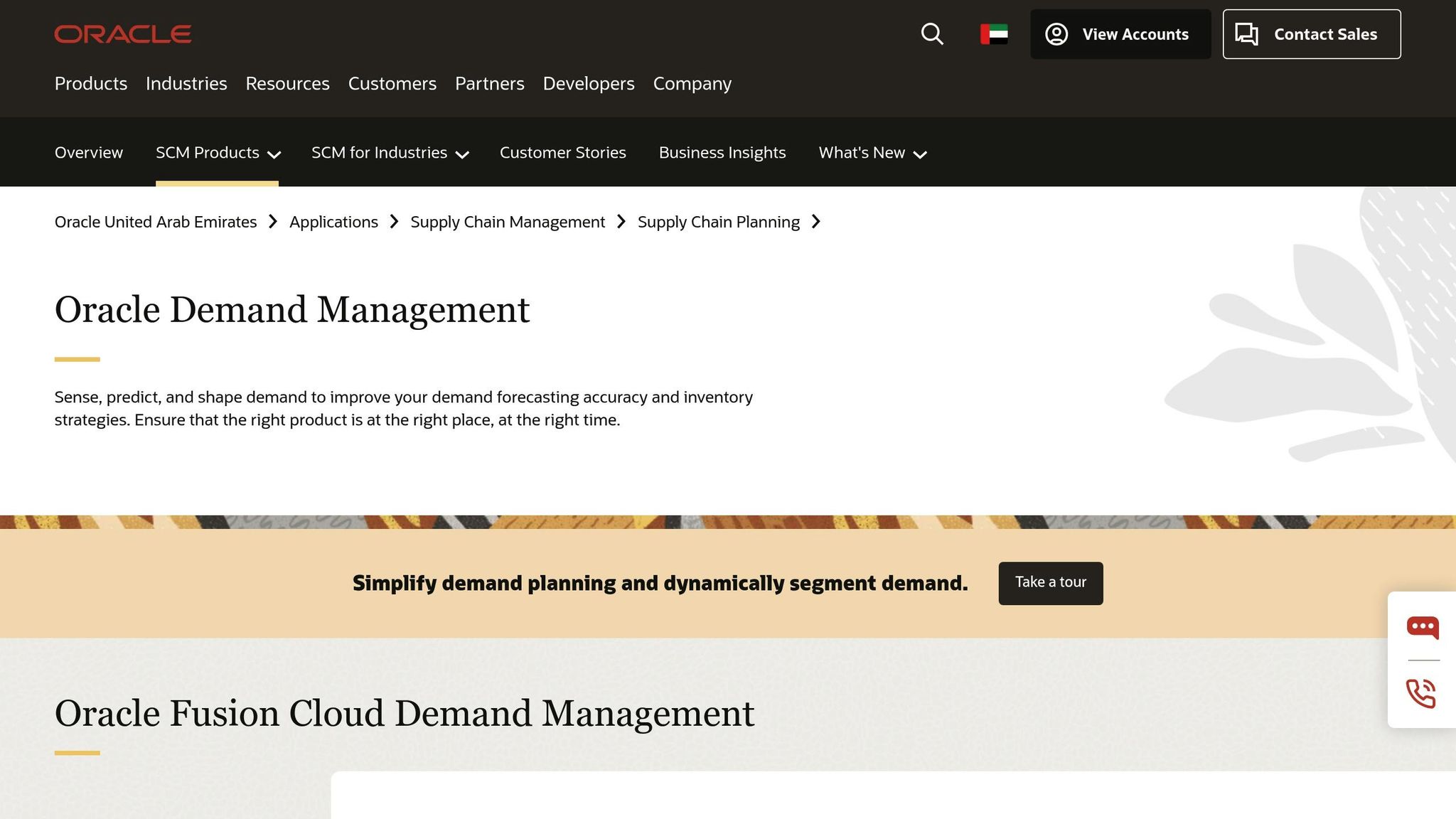
Oracle Demand Management Cloud is a high-performance solution tailored for large and mid-sized businesses in the UAE, with pricing ranging from AED 18,000 to AED 36,000 per month.
Real-time Data Integration and Automation
This platform excels at handling data from multiple sources, automatically importing, cleaning, and transforming it to deliver up-to-date forecasts. Such automation is particularly crucial for businesses operating in the fast-paced GCC market. The seamless flow of data also supports Oracle's advanced predictive capabilities.
AI and Machine Learning for Better Forecasting
Oracle leverages AI and machine learning to enhance forecasting accuracy. These tools adapt dynamically, enabling businesses to see up to a 30% improvement in forecast precision and a 20% reduction in inventory costs when compared to traditional methods. By analysing historical sales, market trends, and external factors, the system identifies seasonal trends, demand surges, and anomalies. This enables businesses to react quickly and refine their strategies.
Integration with ERP, CRM, and E-commerce Platforms
Oracle Demand Management Cloud seamlessly connects with major platforms like Oracle ERP Cloud, SAP, Microsoft Dynamics, and Salesforce. This integration consolidates sales, inventory, and customer data, while pre-built connectors and APIs simplify IT requirements and speed up deployment.
Support for Localisation
Designed with the UAE market in mind, the platform offers full Arabic interfaces, AED (د.إ) currency formatting, DD/MM/YYYY date formats, and metric unit compatibility. It complies with UAE PDPL regulations, supports multi-currency reporting, and ensures regional data residency, aligning perfectly with local business needs.
sbb-itb-058f46d
6. SAP Integrated Business Planning
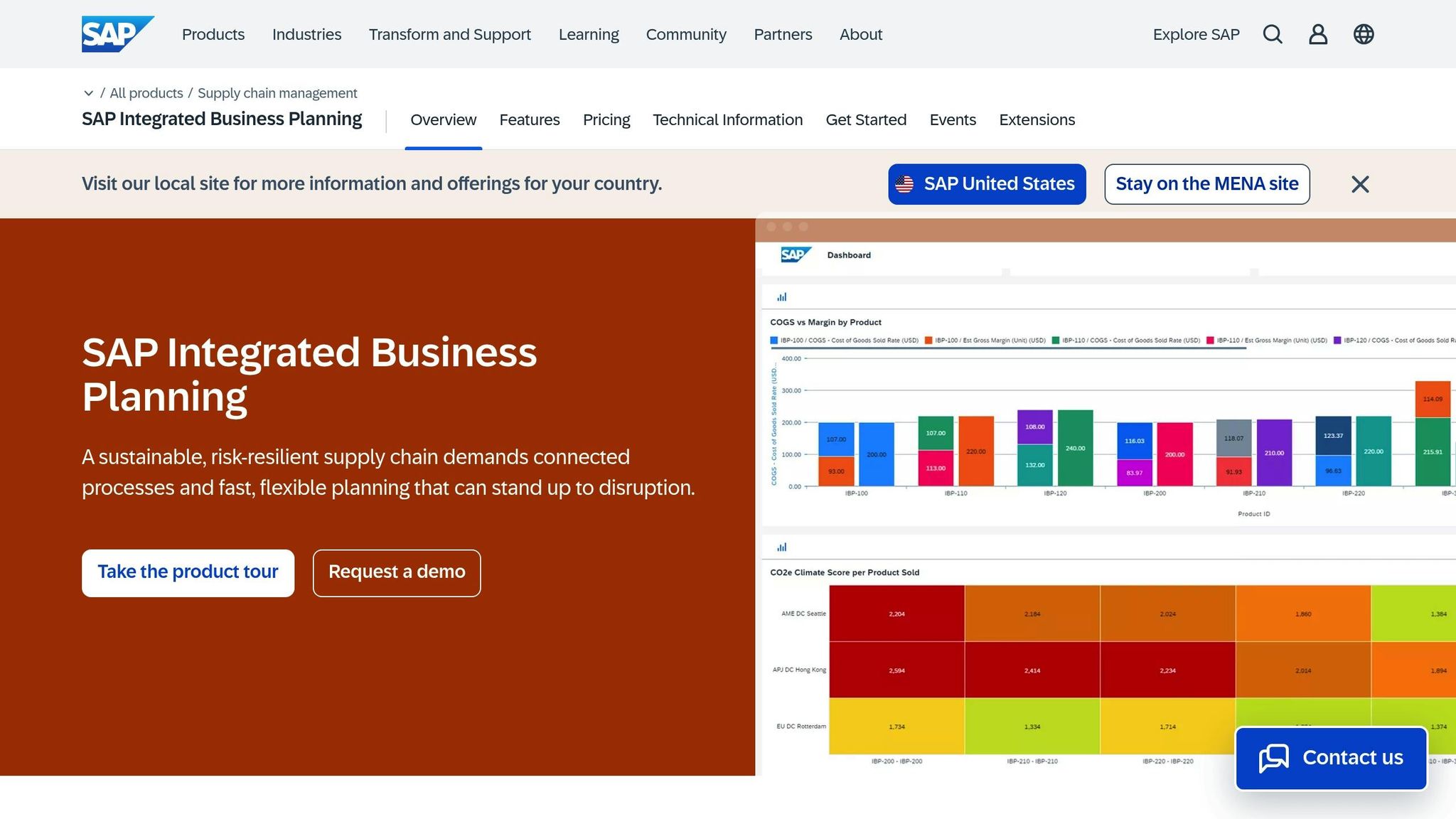
SAP Integrated Business Planning (SAP IBP) is a cloud-based platform tailored for enterprise sales forecasting. Known for its strong integration and localisation capabilities, it caters to large businesses across the GCC region. Pricing for SAP IBP is typically customised based on specific enterprise needs and the number of users, making it a flexible choice for organisations in the UAE. Its ability to seamlessly integrate with existing ERP and CRM systems ensures efficient, real-time data connectivity, continuing the high standards set by other tools in this space.
Real-time Data Integration and Automation
SAP IBP connects directly with SAP S/4HANA, SAP ERP, and various other data sources. This allows for continuous syncing of sales, inventory, and supply data. Automated data ingestion and real-time updates ensure that forecasts remain accurate as new information becomes available.
For example, a leading retail group in the UAE adopted SAP IBP to unify its sales, inventory, and supply chain data across multiple outlets. This implementation led to a 20% reduction in stockouts and a 15% improvement in forecast accuracy. Such results enabled the company to respond more effectively to market demands and seasonal trends.
The platform also provides instant visibility into sales pipeline changes. This is particularly valuable in the fast-paced GCC business environment, where automated alerts for forecast deviations enable businesses to quickly address opportunities or disruptions.
AI and Machine Learning Capabilities for Predictive Accuracy
SAP IBP leverages advanced AI models to analyse historical sales data, market trends, and external factors. These models automatically detect patterns, seasonality, and anomalies, delivering highly accurate sales forecasts that improve over time.
Compared to traditional manual forecasting methods, AI-driven algorithms enhance precision by up to 30%. They adjust forecasts dynamically in response to real-time market signals, such as sudden shifts in demand or disruptions in the supply chain.
By learning from new data, the system continuously refines its predictions. This adaptive capability supports proactive decision-making, enabling businesses in the GCC to stay ahead of changing market conditions and optimise their sales strategies effectively.
Seamless Integration with ERP, CRM, and E-commerce Platforms
Designed for smooth integration, SAP IBP works effortlessly with SAP's ERP and CRM solutions, as well as third-party platforms via APIs and pre-built connectors. Businesses in the UAE can unify data from various sources, including e-commerce platforms, to gain a consolidated view of sales and demand.
Its deep integration with SAP S/4HANA ensures a comprehensive data flow across all business functions. This allows sales forecasts to reflect the latest transactional and customer data, fostering collaborative planning among stakeholders who can contribute to and validate forecasting processes.
Localisation Features for the UAE Market
SAP IBP is well-suited to the UAE market, offering full support for Arabic language interfaces and displaying financial data in AED (د.إ). It adheres to regional data privacy and reporting standards, ensuring compliance with local business practices and regulations.
The platform can be configured to use UAE-specific formats for dates, times, and numbers, while also supporting metric units for measurements. Additionally, it employs robust data encryption, user access controls, and audit trails. With secure data residency options that align with UAE data protection laws and GCC regulatory requirements, SAP IBP is a reliable choice for businesses in the region.
7. Blue Yonder (formerly JDA Software)

Blue Yonder, previously known as JDA Software, is a forecasting platform designed for businesses that require advanced automation and precise predictions. By combining real-time data processing with AI-driven insights, it provides accurate forecasts tailored for UAE enterprises handling complex data sources, extensive integrations, and high transaction volumes. Here's a closer look at its standout features.
Real-time Data Integration and Automation
Blue Yonder brings together data from multiple sources to create a unified and up-to-date sales perspective. It connects directly with ERP, CRM, and e-commerce platforms, ensuring a continuous flow of information that reflects the latest market and sales activities. This automation significantly reduces the need for manual updates by automatically processing and refreshing data, a major advantage for UAE businesses managing large-scale operations across multiple locations.
AI and Machine Learning for Enhanced Predictions
The platform’s AI capabilities are central to its forecasting power. Blue Yonder employs advanced AI and machine learning algorithms to analyse historical sales patterns, market trends, and external factors that influence demand. These models adapt dynamically to new data, fine-tuning forecasts and helping businesses anticipate demand changes.
Its AI engine processes vast datasets, uncovering patterns and correlations that traditional methods might overlook. This includes learning from seasonal trends and market shifts specific to the UAE. Over time, its predictions become even more refined. Beyond forecasting, the system identifies sales opportunities, flags potential risks, and provides recommendations for optimal inventory levels based on anticipated demand.
Seamless Integration with ERP, CRM, and E-commerce Platforms
Blue Yonder is designed to work effortlessly with leading ERP, CRM, and e-commerce platforms. This ensures UAE businesses can consolidate their sales, inventory, and customer data without requiring extensive customisation. The platform supports real-time data synchronisation across connected systems and offers configurable data mappings and business rules, allowing it to align with existing workflows with ease.
Tailored Localisation for UAE Businesses
Blue Yonder is built with the UAE market in mind, offering features that cater to local needs. It includes full Arabic language support, uses AED (د.إ) for financial data, and adheres to UAE-specific date, time, and number formats. The platform also complies with UAE PDPL requirements, featuring robust security measures, regional data hosting, and detailed audit trails. With data residency options that meet local regulations and tools for monitoring user access, businesses in the UAE can trust the platform to support their compliance and forecasting needs confidently.
8. IBM Planning Analytics
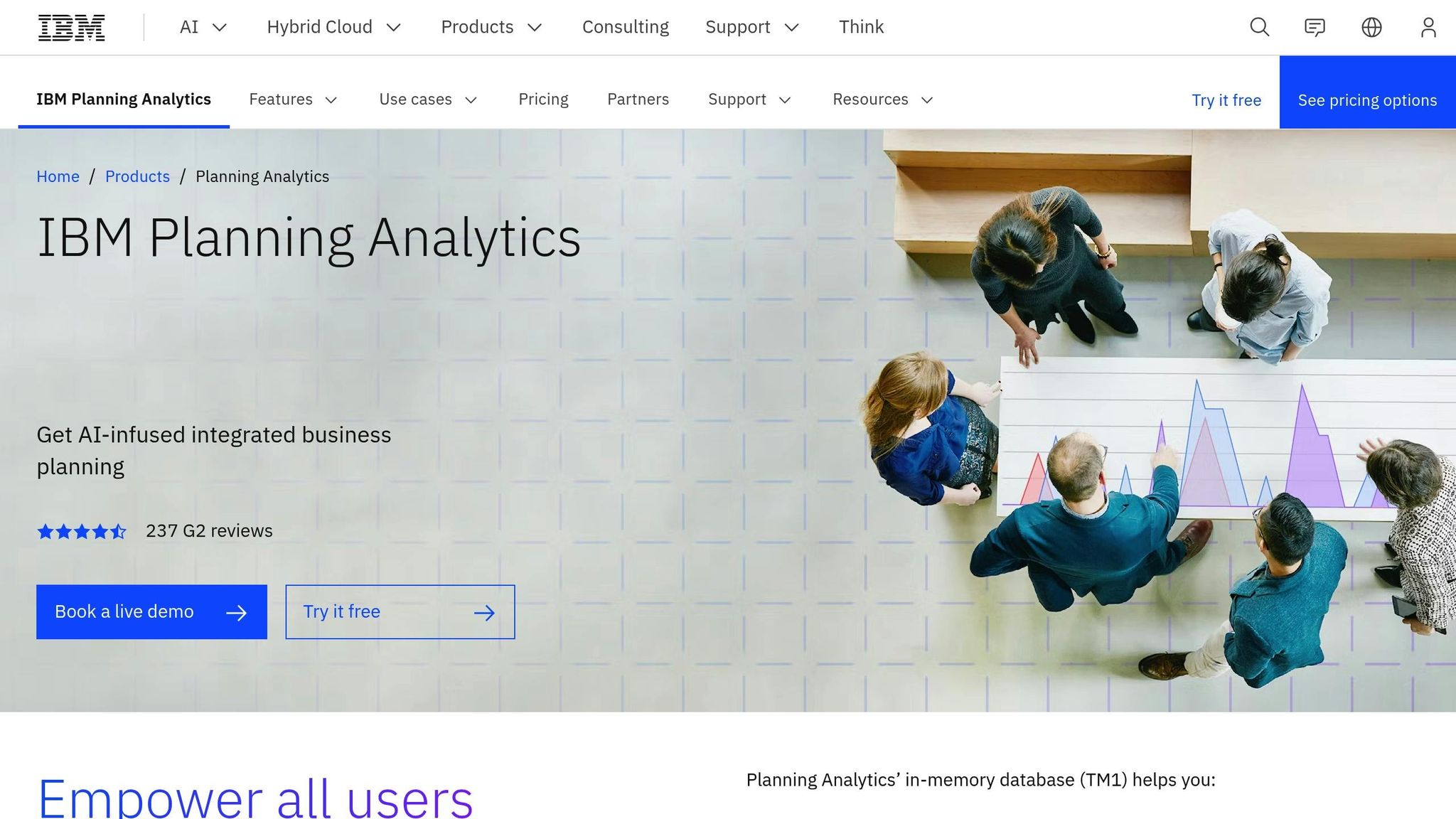
IBM Planning Analytics is a robust forecasting platform built on IBM TM1, tailored for enterprises with complex operations requiring real-time analytics. For UAE businesses managing intricate operations across various channels, this platform offers the capacity to handle large datasets while maintaining precision in sales forecasting.
Real-Time Data Integration and Automation
IBM Planning Analytics seamlessly integrates with multiple data sources across core business systems, ensuring forecasts are consistently accurate and up-to-date. Its automation features minimise manual effort by enabling scheduled data updates and automated approval workflows.
The system also triggers alerts and actions automatically when forecast changes occur, simplifying operations for UAE businesses dealing with vast datasets. This is particularly beneficial for retail and manufacturing companies in the GCC, where constant synchronisation of data across multiple locations is essential.
For instance, a prominent UAE retail group adopted IBM Planning Analytics to consolidate sales data from its stores and e-commerce platforms. By automating data collection and updates, they eliminated the need for manual inputs, gaining real-time insights into performance across all sales channels. This streamlined data flow also sets the stage for the platform's AI-driven predictive capabilities.
AI and Machine Learning Capabilities for Enhanced Forecasting
IBM Planning Analytics leverages advanced AI and machine learning to analyse historical sales data, spot patterns, and generate precise forecasts. These tools adjust predictions dynamically based on new data, identify anomalies, and support scenario modelling.
The platform's real-time scenario modelling allows users to evaluate the impact of changes in pricing, sales assumptions, or market shifts instantly. Features like predictive forecasting, anomaly detection, and natural language querying make sophisticated analytics accessible, even for users without technical expertise.
The same UAE retail group improved its forecast accuracy by 18% using the platform's AI-driven tools. This boost in accuracy led to lower inventory costs and quicker responses to changing market demands, aligning with their growth objectives across the GCC.
Seamless Integration with ERP, CRM, and E-commerce Platforms
IBM Planning Analytics also excels in integrating with leading ERP systems (SAP, Oracle, Microsoft Dynamics), CRM platforms (Salesforce, HubSpot), and e-commerce solutions. This seamless interoperability allows UAE businesses to unify sales, inventory, and customer data for comprehensive forecasting without the need for extensive customisation.
The platform's integration framework ensures data remains consistent across systems, helping businesses avoid costly overhauls of their existing technology stack while still gaining advanced forecasting capabilities.
Localisation Features for UAE Businesses
IBM Planning Analytics is designed with UAE-specific localisation in mind. It supports multi-language functionality, including Arabic, displays financial data in AED, and adheres to local date and number formats.
The platform also aligns with UAE data privacy laws, including the Personal Data Protection Law (PDPL). It offers enterprise-grade security measures such as data encryption, user access controls, and detailed audit trails. Additionally, it can be hosted in data centres that comply with UAE data residency requirements, ensuring full regulatory compliance.
To support UAE businesses, IBM and its regional partners provide tailored training and ongoing assistance in both English and Arabic. This includes online tutorials, in-person workshops, and dedicated customer service, ensuring a smooth implementation process.
Features and Pricing Comparison
Selecting the right forecasting tool comes down to understanding your business needs and matching them with the features, pricing, and capabilities of available solutions. The eight tools reviewed here range from advanced enterprise-grade platforms to more accessible options for smaller businesses, catering to a variety of requirements.
Enterprise-Level Solutions like Salesforce, Oracle Demand Management Cloud, SAP Integrated Business Planning, and IBM Planning Analytics offer custom pricing tailored to large organisations. These platforms provide powerful tools such as AI-driven scenario modelling, real-time pipeline insights, and compliance support specific to the UAE. Their advanced features and higher complexity make them ideal for large enterprises with significant forecasting needs and dedicated IT teams.
Mid-Market and SME Options are generally more straightforward in pricing. Zendesk Sell offers tiered plans for growing teams, while Anaplan combines enterprise-level scenario planning and predictive analytics, though it typically requires custom pricing discussions. For smaller teams, Compass stands out as the most cost-effective choice, offering intuitive dashboards and real-time pipeline insights.
| Tool | Key Strengths | Pricing (AED) | Best For | Regional Compliance |
|---|---|---|---|---|
| Salesforce | Scalable AI analytics; CRM integration | Custom | Large enterprises; multi-sector | Full Arabic support; UAE data residency |
| Anaplan | Scenario planning; predictive modelling | Custom | Enterprises with complex forecasting | Yes, with localisation options |
| Compass | Real-time pipeline insights; dashboards | Custom (competitive) | SMEs; mid-market companies | Standard compliance features |
| Zendesk Sell | Win probability tracking; pipeline insights | Tiered plans | SMEs; growing sales teams | Basic compliance; multi-currency |
| Oracle Demand Management Cloud | Demand planning; supply chain integration | Custom | Large retail; manufacturing | Full UAE compliance; Arabic interface |
| SAP Integrated Business Planning | Integrated planning; real-time analytics | Custom | Large enterprises; complex operations | Comprehensive regional support |
| Blue Yonder | Demand forecasting; supply chain integration | Custom | Manufacturing; retail enterprises | Industry-specific compliance |
| IBM Planning Analytics | AI-driven modelling; scenario planning | Custom | Complex enterprises; data-heavy ops | Full localisation; security compliance |
Sector-Specific Needs
Certain platforms cater specifically to industry requirements. For example, retail businesses in the UAE often prefer Oracle Demand Management Cloud or SAP Integrated Business Planning for inventory forecasting and seasonal demand planning. Manufacturing companies benefit from Blue Yonder, which excels in demand forecasting and supply chain integration. On the other hand, service-oriented businesses might lean towards Salesforce and Zendesk Sell, as their CRM-centric features align well with client management.
Implementation Timelines
Enterprise-grade tools typically require 3–6 months for full deployment due to their complexity, whereas mid-market solutions can often be up and running within weeks. Factoring in implementation time is crucial, as delays can increase overall costs.
For UAE-based companies, platforms like Oracle, SAP, and IBM Planning Analytics provide robust regional support, including local data centres and Arabic-language interfaces. These features are essential for businesses in regulated sectors like finance and healthcare, where data sovereignty and compliance are top priorities.
AI and Integration Capabilities
All eight platforms feature AI-driven scenario modelling, enabling businesses to simulate market changes, seasonal trends, and team performance variations. However, the level of control and customisation varies. Salesforce stands out with its seamless CRM integration, while Oracle and SAP are unmatched in ERP connectivity. By unifying data sources, these tools reduce manual effort and ensure consistent reporting.
When choosing a forecasting tool, UAE businesses should look beyond the initial pricing. Consider the total cost of ownership, which includes implementation, training, and ongoing support. A solution that combines real-time insights, advanced AI features, and compliance with UAE regulations will provide the foundation for success in an ever-changing market.
Real-World Applications for UAE Businesses
In the UAE, real-time sales forecasting tools are becoming indispensable across industries. Companies are using these tools to streamline their operations, tackle specific challenges, and improve teamwork. By doing so, businesses can better manage inventory, enhance collaboration, and achieve noticeable results. Let’s dive into how different sectors in the UAE are leveraging these tools to their advantage.
Retail and E-commerce Success Stories
One of the UAE's top electronics retailers adopted Salesforce Sales Cloud with Einstein AI to transform its sales forecasting process. By moving away from manual, spreadsheet-based predictions, the retailer achieved a 20% drop in stockouts and improved revenue predictability. This was especially crucial during high-demand periods like Ramadan, where precise forecasting ensured better inventory management. The company also invested in data cleaning and team training, which significantly boosted forecast accuracy and customer satisfaction.
Supply Chain and Logistics Optimisation
A logistics provider in the UAE turned to Oracle Demand Management Cloud to align inventory levels with real-time sales data across its distribution network. The result? A 15% reduction in excess inventory and improved order fulfilment rates. The implementation process, completed in just a few months, involved customising the system and aligning processes to integrate seamlessly with existing ERP systems, which ultimately enhanced operational efficiency.
Manufacturing and Industrial Applications
In the manufacturing sector, UAE-based companies have embraced tools like Blue Yonder for better demand forecasting and supply chain integration. These tools allow manufacturers to synchronise production schedules with market demand, ensuring smoother operations and reduced inefficiencies.
Implementation Timelines and Deployment Strategies
Cloud-based solutions such as Zendesk Sell are gaining popularity due to their quick deployment timelines - often just a matter of weeks. These include data integration and user training, making them ideal for rapidly growing businesses. On the other hand, enterprise platforms like SAP Integrated Business Planning and Oracle Demand Management Cloud require more extensive customisation and process alignment, but they offer robust features for large-scale operations.
Overcoming Common Implementation Challenges
Implementing forecasting tools comes with its own set of challenges, particularly around data integration and quality. To address these, companies in the UAE are advised to start with pilot projects, clean their data rigorously, and provide thorough training for their teams. Additionally, compliance with the UAE’s Personal Data Protection Law (PDPL) makes it critical to choose vendors that prioritise strong security measures.
Measurable Business Outcomes and Best Practices for Maximising ROI
UAE businesses often report clear benefits after adopting real-time sales forecasting tools. For instance, forecast accuracy typically improves by 10–20%. Teams also experience shorter sales cycles as they can identify and focus on high-conversion opportunities. Automating reporting and reducing reliance on manual processes further enhances productivity.
To maximise ROI, companies should consider starting with pilot projects to test forecast accuracy and user adoption before rolling out the solution fully. Maintaining clean and updated CRM data is another key practice, as is fostering collaboration among sales, finance, and operations teams. Monitoring key metrics - like forecast accuracy, inventory turnover, and sales cycle length - can help identify areas for continuous improvement.
Cultural and Regional Considerations
Seasonal patterns, such as the increased activity during Ramadan and public holidays, play a significant role in the UAE market. Forecasting tools that account for these local business cycles can provide more accurate and actionable insights for businesses operating in the region.
Conclusion
Selecting the right real-time sales forecasting tool is no longer a luxury - it's a necessity for businesses in the UAE navigating a fast-paced and competitive market. Each of the eight tools discussed offers distinct advantages, whether it’s Salesforce’s seamless CRM integration or Blue Yonder’s precise supply chain focus. The key is to align the tool with your business size, industry requirements, and growth objectives.
AI-powered analytics have become a cornerstone for thriving in the UAE's diverse and rapidly evolving marketplace. These tools empower businesses to anticipate demand shifts, allocate resources effectively, and respond swiftly to market changes - capabilities that are especially vital in a region characterised by its multicultural dynamics and swift economic growth. The ability to forecast not only the likelihood of closing deals but also their probable timelines provides sales leaders with unparalleled insight and control over their pipelines. This predictive capability underscores the importance of real-time decision-making highlighted throughout this article.
The rising adoption of AI-driven sales solutions reflects the UAE’s broader commitment to digital transformation and data-driven business strategies. The regional CRM market’s growth further reinforces this trend, making it clear that businesses must embrace these technologies to remain competitive.
However, the foundation of any successful implementation lies in data quality. Accurate and well-organised CRM data is critical for ensuring reliable forecasts, regardless of the tool you choose.
Pricing for these tools ranges from AED 70 per user per month to bespoke enterprise-level quotes. Yet, the true value lies in the tangible benefits they deliver - better forecast accuracy, shortened sales cycles, and more effective strategic planning.
FAQs
What should I consider when selecting a real-time sales forecasting tool for my business in the UAE?
Choosing a real-time sales forecasting tool for your business in the UAE requires careful consideration of several important factors. Begin by pinpointing your specific needs - do you need advanced analytics, seamless integration with your current systems, or AI-powered insights? It’s also essential to evaluate how user-friendly the tool is, whether it can grow with your business, and how well it fits into your team’s daily operations.
Don’t forget to examine the pricing in AED to ensure it works within your budget. Look for tools that offer features tailored to the GCC market and provide localised support. Most importantly, focus on solutions that deliver precise, real-time data, empowering you to make well-informed decisions and support consistent growth.
What features should a sales forecasting tool have to align with UAE business regulations?
When choosing a sales forecasting tool for your business in the UAE, it’s important to ensure it aligns with local regulations and business norms. Prioritise tools that offer customisable reporting to address UAE-specific tax requirements, such as VAT compliance, and generate clear financial summaries in AED (د.إ).
The tool should also integrate smoothly with your current systems, offer Arabic language support where necessary, and use the local date format (DD/MM/YYYY). Having software capable of delivering precise data analytics and projections tailored to the GCC market will enable you to make well-informed decisions while staying compliant with regulations.
How do AI and machine learning improve sales forecasting accuracy in dynamic markets like the UAE?
AI and machine learning are transforming sales forecasting by processing massive datasets in real time, uncovering patterns, and predicting future trends with impressive accuracy. These tools adjust dynamically to shifts in market conditions - whether it’s seasonal demand changes or economic ups and downs - making predictions more dependable and practical.
In fast-moving markets like the UAE, AI-powered systems can analyse localised data, including regional purchasing trends and economic signals, to provide insights that align with the specific needs of businesses. This allows companies to make smarter decisions, fine-tune inventory management, and enhance customer experiences, all of which contribute to steady and long-term growth.
